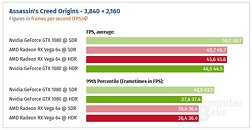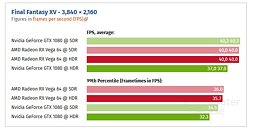Raevenlord
News Editor
- Joined
- Aug 12, 2016
- Messages
- 3,755 (1.23/day)
- Location
- Portugal
| System Name | The Ryzening |
|---|---|
| Processor | AMD Ryzen 9 5900X |
| Motherboard | MSI X570 MAG TOMAHAWK |
| Cooling | Lian Li Galahad 360mm AIO |
| Memory | 32 GB G.Skill Trident Z F4-3733 (4x 8 GB) |
| Video Card(s) | Gigabyte RTX 3070 Ti |
| Storage | Boot: Transcend MTE220S 2TB, Kintson A2000 1TB, Seagate Firewolf Pro 14 TB |
| Display(s) | Acer Nitro VG270UP (1440p 144 Hz IPS) |
| Case | Lian Li O11DX Dynamic White |
| Audio Device(s) | iFi Audio Zen DAC |
| Power Supply | Seasonic Focus+ 750 W |
| Mouse | Cooler Master Masterkeys Lite L |
| Keyboard | Cooler Master Masterkeys Lite L |
| Software | Windows 10 x64 |
The folks over at Computerbase.de have took it into their hands to study exactly how much of an impact >(if any) would activating HDR on a 4K panel affect performance cross different hardware configurations. Supposedly, HDR shouldn't impose any performance penalty on GPUs that were designed to already consider that output on a hardware level; however, as we know, expectations can sometimes be wrong.

Comparing an AMD Vega 64 graphics card against an NVIDIA GeForce 1080, the folks ate Computerbase arrived at some pretty interesting results: AMD hardware doesn't incur in as big a performance penalty (up to 2%) as NVIDIA's graphics card (10% on average) when going from standard SDR rendering through to HDR rendering. Whether due to driver-level issues or not is unclear; however, it could also have something to do with the way NVIDIA's graphics cards process 4K RGB signals by applying color compression down to reduced chroma YCbCr 4:2:2 in HDR - an extra amount of work that could reduce frame rendering. However, it's interesting to note how Mass Effect Andromeda, one of the games NVIDIA gave a big marketing push for and that showcased HDR implementation, sees no performance differential on the green hardware.I also seem to remember some issues regarding AMD's frame time performance being abysmal - looking at Computerbase's results, howveer, those times seem to be behind us.




View at TechPowerUp Main Site

Comparing an AMD Vega 64 graphics card against an NVIDIA GeForce 1080, the folks ate Computerbase arrived at some pretty interesting results: AMD hardware doesn't incur in as big a performance penalty (up to 2%) as NVIDIA's graphics card (10% on average) when going from standard SDR rendering through to HDR rendering. Whether due to driver-level issues or not is unclear; however, it could also have something to do with the way NVIDIA's graphics cards process 4K RGB signals by applying color compression down to reduced chroma YCbCr 4:2:2 in HDR - an extra amount of work that could reduce frame rendering. However, it's interesting to note how Mass Effect Andromeda, one of the games NVIDIA gave a big marketing push for and that showcased HDR implementation, sees no performance differential on the green hardware.I also seem to remember some issues regarding AMD's frame time performance being abysmal - looking at Computerbase's results, howveer, those times seem to be behind us.




View at TechPowerUp Main Site






 ) tv and my point was that you can game at 4k with thise cards.
) tv and my point was that you can game at 4k with thise cards.